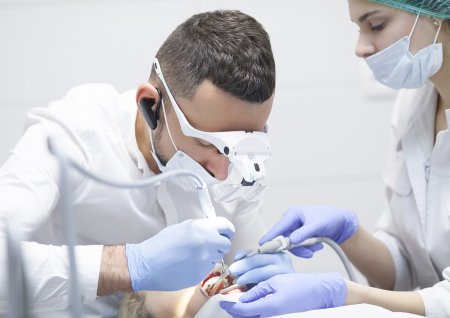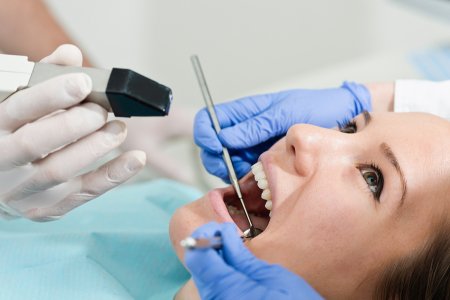-
What to Expect During Your First Root Canal
Root canals are performed on teeth that are infected or have a significant amount of decay. The procedure is done to remove the infected nerves and pulp so that the tooth can be restored rather than removed. People are often nervous before their first root canals, but the procedure is much easier than you may think. Here is a look at what to expect if your dentist recommends that you have a root canal.
Anesthesia
In reality, you could have a root canal without anesthesia, because the nerve is dead and can’t cause pain. Nonetheless, your dentist will provide local anesthesia to numb the area. This is done to ensure you are completely comfortable and relaxed for the procedure. You will also have an x-ray in preparation of the root canal and anesthesia so that your dentist can determine exactly where you need to be numb and to look for signs of infection on the bone.

Removing the Bacteria
Once you are numb, your dentist will place a rubber dam around your tooth to keep the area dry and then drill an access hole in the top of the tooth. Using a series of files, your dentist will remove all of the bacteria and decayed tissue . Once the tooth is cleaned, the dentist will seal the root canals and close the access hole with a filling, unless he or she wants to put medication into the tooth. If medication is placed inside the tooth, you will receive a temporary filling while the medication works. After a week, the temporary filling will be removed and the tooth will be sealed.
Crown Placement
A crown can be placed over the tooth after a root canal is complete. The crown is used to make the tooth look uniform with the rest of your smile and to ensure it functions properly. A crown can be placed at the same appointment, or your dentist may have you come back for the crown at a later visit.
Glenwood Premier Dental performs root canals in Hazlet in our office, giving patients the convenience of having all of their dental care done in a single location. Contact us today at (732) 264-4477 to make an appointment.
-
Why You Shouldn’t Delay Emergency Dental Care
If you’re dealing with a dental emergency, it’s important to seek treatment right away. Seeing your dentist for emergency care as soon as possible can help to prevent long-term complications and minimize the need for future treatment.

A number of different issues can lead to the need to see an emergency dentist, including chipped teeth, knocked-out teeth, severe toothaches, and denture problems. If you’ve lost or broken a tooth, seeing your dentist as soon as possible will give him or her the chance to save your natural tooth, so you don’t need a dental implant. For severe toothaches, emergency care can get you out of pain and help you avoid the complications associated with dental abscesses.
At Glenwood Premier Dental, we offer emergency care to our patients with same-day appointments for urgent needs. To learn more about making an appointment with an emergency dentist in Hazlet and all of our services, please call (732) 264-4477.
-
Choosing Between Bonding and Veneers to Repair Damaged Teeth
If you want to improve the appearance of your smile, your cosmetic dentist may recommend either bonding or veneers. Both of these treatments can correct a range of aesthetic problems with your teeth, so which option is the right one for you? Here is what you need to know.
Veneers and Bonding 101
Veneers and bonding are both cosmetic dentistry procedures. Veneers involve the placement of thin, porcelain shells on the surfaces of the teeth, creating a uniform appearance and brighter smile. Bonding involves using a composite material to fix cracks and other irregularities and to correct minor size and spacing issues. Because veneers are made of porcelain, they are stronger than the composite resin used during bonding.

Conditions Treated
Both veneers and bonding can fix chips, cracks, and gaps between the teeth. Veneers can fix severe staining, while bonding is good for addressing minor stains. Veneers can also help to address overlapping or cooked teeth and teeth that are worn out from grinding. Bonding is helpful in protecting roots that have been exposed by receding gums.
Picking the Right Treatment
If you only have a few teeth that need treatment and the issues with those teeth are minor, then bonding may be a faster, less expensive choice. Bonding is completed in one session, and unlike veneers, it doesn’t require removing any of your tooth enamel. The downside is that bonding is not as strong as veneers and will usually need to be replaced within 10 years. Veneers can fix more severe issues, and when treating multiple teeth, they are often better at achieving a uniform appearance than bonding. Veneers do require a small layer of enamel to be removed from the teeth, so they are a permanent treatment. Veneers need to be replaced about every 15 years.
Talk to a cosmetic dentist in Hazlet at Glenwood Premier Dentistry to find out which treatment is the right choice for your needs. We offer a variety of cosmetic dentistry procedures to help you get the smile you want. Schedule an appointment for a consultation today by calling (732) 264-4477.
-
Why Soda Is the Enemy of Good Oral Health
Most people know that soda isn’t great for your teeth, but what makes it so damaging? This video explains why your dentist may have recommended that you stay away from soda to keep your teeth in top condition.
Regular soda causes two problems for your teeth. The sugar in the soda causes bacteria to proliferate in your mouth, leading to decay, and the acid in the soda strips away tooth enamel. Diet soda doesn’t have sugar, but it is still high in acid, which causes the same problems for your enamel.
Glenwood Premier Dental is here to help you make the right choices for your oral health, with a combination of cutting-edge treatments and thorough dental exams. Make an appointment with our dentist in Hazlet by calling (732) 264-4477.
